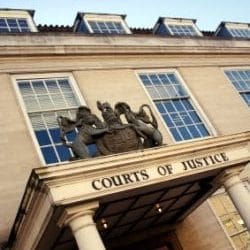
Courts: Advocates are key workers
Legal professionals involved in court and tribunal hearings, as well as those advising people deprived of their liberty or on executing wills are ‘keyworkers’, the Ministry of Justice (MoJ) has said.
As a result, if they cannot have their children safely looked after at home, they will be prioritised for education provision at schools and nurseries.
It came as the Lord Chief Justice, Lord Burnett, paused new jury trials following pressure from the profession.
The government initially said simply that those “essential to the running of the justice system” were keyworkers.
The MoJ clarified on Sunday that this group is made up of:
- Advocates (including solicitor-advocates) required to appear before a court or tribunal (remotely or in person), including prosecutors;
- Other legal practitioners required to support the administration of justice including duty solicitors (police station and court) and barristers, solicitors, legal executives, paralegals and others who work on imminent or ongoing court or tribunal hearings;
- Solicitors acting in connection with the execution of wills; and
- Solicitors and barristers advising people living in institutions or deprived of their liberty.
The MoJ acknowledged that some legal practitioners would “intermittently” fall into this category “because they need to provide advice or attend a hearing for an urgent matter relating, for example, to safeguarding of children or vulnerable adults, or a public safety matter”.
For the limited time required to deliver this work, a legal practitioner will be a key worker. Otherwise, they will not.
The MoJ warned that, as events evolved, this guidance may change.
Bar Council chair Amanda Pinto QC: “Barristers should decide for themselves whether they fall within the category of key worker and, if so, whether they can nevertheless keep their children at home or need to send them to school.
“As the short government guidance states, it may be that you don’t fall into the category of key worker all the time, but there comes a point when you do, because of a change of workload.
“We appreciate the very considerable challenges you face and the changes you are all making to keep the justice system operating as best it can.”
Meanwhile, MailOnline yesterday quoted a “seasoned county court judge” – speaking on the condition of anonymity – as warning that the courts were not enforcing social distancing and were potential coronavirus “contamination hotbeds”.
They said the “woeful” technology in most civil courts meant in many cases video-link hearings were not possible
The judge lamented the “disconnect” with those steering the court’s response to the health emergency, who “do not understand what is going on down at the coalface”.
They said: “We have nobody at the door asking if people are ill. There are waiting rooms where we have no control over the number of people…
“I feel much safer than most because judges have their own entrances, but even so I’m passed grubby bits of paper and I don’t know where it’s been.”
Many lawyers have been urging the government to suspend jury trials because of social distancing, but HM Courts & Tribunals Service chief executive Susan Acland-Hood has been pushing back on this over the weekend on Twitter.
She told Mark George QC, head of Garden Court North Chambers: “The MOJ is not working independently from the rest of Government. Hence jurors being included in the list of key workers published at the end of last week. Don’t come if you are vulnerable, or showing symptoms. But otherwise, do come – because justice is not optional.”
Criminal law barrister Victoria Hill of 12CP in Southampton, tweeted in response: “I had a 2 day trial last week. Recorder self isolated on day 2 following persistent coughing. Jury were told that Judge had self diagnosed coronavirus. You should have seen the poor jurors faces when they were told. The witnesses and defendant have to come back and do it again.”
On Monday morning, however, Lord Burnett said he has decided that “we need to pause jury trials for a short time to enable appropriate precautions to be put in place”.
No new trials are to start this morning as a result. “Jurors summoned for this week are being contacted to ask them to remain at home, and contact the court they are due to attend. They will only be asked to come in for trials where specific arrangements to ensure safety have been put in place.
“In some cases, this may mean that jurors may be called in to start a new trial later on Monday. All hearings in the Crown Court that can lawfully take place remotely should do so and other hearings not involving a jury should continue if suitable arrangements can be made to ensure distancing.”
Lord Burnett said efforts to bring existing jury trials to a conclusion should continue so long as social distancing in accordance with Public Health England guidelines can be maintained. “Considerable imagination and flexibility may be needed to achieve that… If it is necessary to adjourn trials already underway for a short period to put those safety measures in place, this must be done.”
The same considerations applied to magistrates’ courts, he added, while in the civil and family courts, hearings requiring the physical presence of parties and their representatives and others “should only take place if a remote hearing is not possible and if suitable arrangements can be made to ensure safety”.
Ms Acland-Hood also confirmed that judges would be using Skype for Business for video hearings as it was already on all judicial and HMCTS staff laptops “and we have been able to solve firewall issues that limit external connections to it in normal times”.
She revealed too that a new cleaning contract for all courts starts on 1 April. “Better, tighter contracts and a different firm. Timing obviously terrible, and we are working as hard as we can with the existing contractor.”